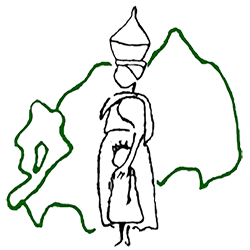RVCP has been running this project since 2005 and has provided two Ventilated Improved Pit (VIP) Latrines for four vulnerable families each year. To date, 26 of the 125 households in the target village of Mpungwe have access to a VIP latrine and the local primary school has also benefitted from an ECOSAN latrine. Additionally, RVCP has conducted house to house teaching sessions to compliment the provision of latrines.
Aims
- Construct two latrines for four families per year
- Raise awareness about hygiene and sanitation through school education sessions
- Promote community education on issues of sanitation
The Project
Latrine construction
Following local governmental advice, the selection of vulnerable families who benefit from the latrines would be completed at local community meetings. Four families are selected during village community meeting through votes of those who need it more urgently than others and who are not able to afford latrine themselves like widows, orphans children, elders and other poor families. Members of the hygiene program will continually monitor the progress of the building work, visiting the construction sight 5 times.
- preventing Pollution rather than attempting to control it after we pollute; and using the safe products for agricultural purposes.
- sanitizing the Urine and the faeces;
- and using the safe products for agricultural purposes. So far we have built ECOSAN latrines at Rukara Primary school in Huye District. Now we have an ambitious project to build the EcoSan at LLCCM orphanage, Huye health center and in Rukira and Nyakagezi primary schools.
Following the community sessions, two RVCP volunteers will conduct further house-to-house education sessions once a week. These sessions aim to evaluate the community workshops with the use of an additional interview based questionnaire and will address any outstanding problems or points of confusion related to hygiene, both personal and domestic. Two families each week for 28 weeks will be interviewed.
RVCP members also propose to conduct 28 teaching sessions in a local primary school, focusing on students aged 6-11. Lessons would focused on the importance of personal hygiene: hand washing, washing the body, oral hygiene and clean water practices. Songs, posters and group discussions are used as methods to educate pupils.




